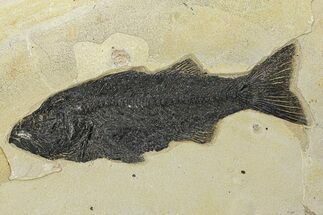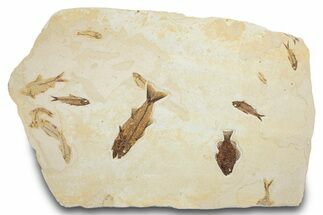This Specimen has been sold.
10.15" Uncommon Fish Fossil (Mioplosus) - Wyoming
This is a detailed, 10.15" long fossil fish (Mioplosus labracoides), one of the more uncommon species from the Green River Formation (Gastropod Layer). It was collected from Lindgren Quarry near Kemmerer, Wyoming. Superb preservation and preparation.
It is accompanied by an acrylic-metal display stand.
It is accompanied by an acrylic-metal display stand.
Mioplosus is a genus of large extinct perciform fish that lived through the Eocene epoch. This genus is easily distinguished by an elongate fusiform body, double dorsal fins, and forked tail. Mioplosus was a solitary predator with large teeth: a few fossil specimens have been collected with other, smaller fish lodged in their throats. Most fossils of this genus are from the Tertiary-aged Green River Formation in Wyoming, though relatives of this genus are known to range throughout Asia and New Zealand. Mioplosus is also believed to be related to the modern pike-perch of the genus Sander (Stizostedion).
About Fossil Lake
50 million years ago, in the Eocene epoch, these fish thrived in Fossil Lake, which was fed by the Uinta and Rocky Mountain highlands. The anoxic conditions at the bottom of Fossil Lake slowed bacterial decomposition, prevented scavengers from disturbing corpses, and, most interestingly, suffocated creatures that ventured into the oxygen-starved aquatic layer. The result is a miraculous exhibition of Eocene biota: a subtropical aquatic community within sycamore forests, teeming with creatures such as freshwater stingrays, dog-sized horses, menacing alligators, early flying bats, and one of the first primates.
50 million years ago, in the Eocene epoch, these fish thrived in Fossil Lake, which was fed by the Uinta and Rocky Mountain highlands. The anoxic conditions at the bottom of Fossil Lake slowed bacterial decomposition, prevented scavengers from disturbing corpses, and, most interestingly, suffocated creatures that ventured into the oxygen-starved aquatic layer. The result is a miraculous exhibition of Eocene biota: a subtropical aquatic community within sycamore forests, teeming with creatures such as freshwater stingrays, dog-sized horses, menacing alligators, early flying bats, and one of the first primates.
SPECIES
Mioplosus labracoides
LOCATION
Lindgren Quarry, Kemmerer, Wyoming
FORMATION
Green River Formation (Gastropod Layer)
SIZE
Fish: 10.15" long, Shale: 11.5 x 8.1"
CATEGORY
SUB CATEGORY
ITEM
#292343
We guarantee the authenticity of all of our specimens.
 Reviews
Reviews













